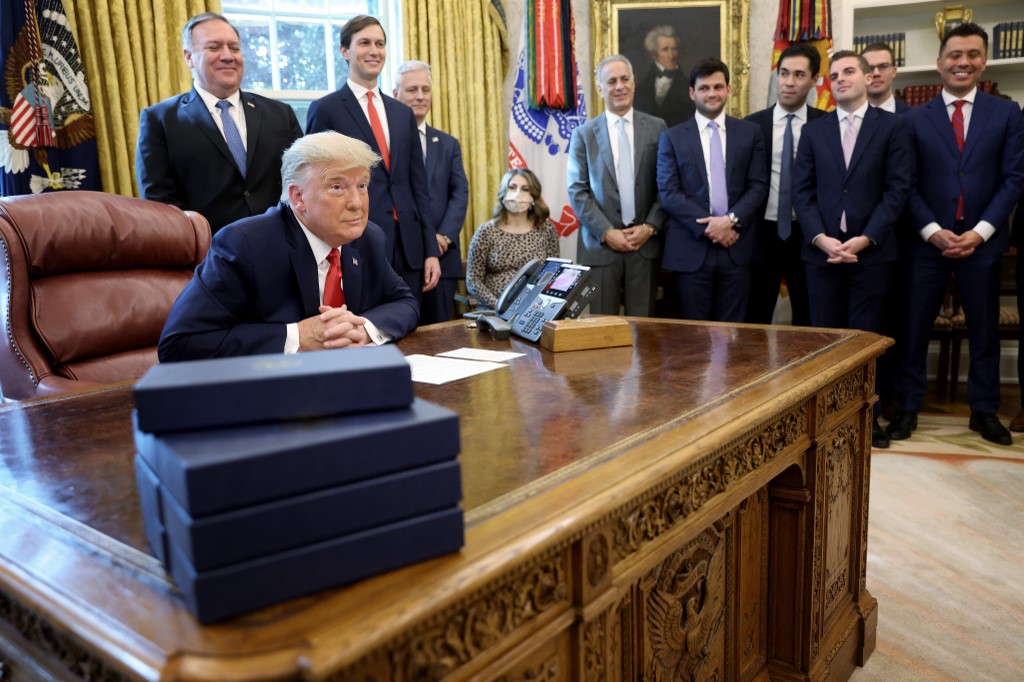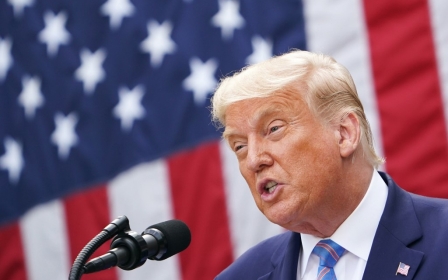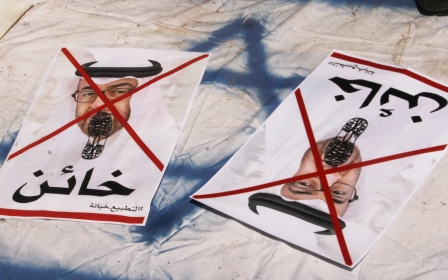Israel-Sudan deal: A symbolic blow to Arab support for Palestine

On 23 October, in front of media in the Oval Office, US President Donald Trump announced that Sudan and Israel had agreed to normalise relations, and claimed credit for brokering the deal. The agreement attracted much less media attention, and sparked much less controversy in the Arab world, than the ones signed in September by the UAE and Bahrain with Israel.
Sudan and Israel have no common borders and were not at war. What, then, is the significance of this agreement?
The deeper reason for Trump's merciless bullying of Sudan's fragile transitional government to normalise relations with Israel is his unconditional support for the extreme Israeli right
The easiest part to explain is the deal’s timing. Less than two weeks before the presidential election, with polls showing him badly trailing his Democratic opponent, Joe Biden, Trump wanted a foreign policy success to please supporters of Israel in the Democratic camp and among Christian evangelists.
But since 1968, on average 71 percent of American Jews have voted for the Democratic Party, while the support of Christian evangelists for the Republican Party can be taken for granted. It should have therefore been obvious from the start that the electoral advantage of this deal would be marginal, if not negligible.
The deeper reason for Trump’s merciless bullying of Sudan’s fragile transitional government to normalise relations with Israel is his unconditional support for the extreme Israeli right, and deep-rooted hostility towards the Palestinian struggle for independence and statehood.
This hostility resulted in a series of body blows that Trump has dealt to the Palestinian national cause, such as closing down the Palestine Liberation Organisation's office in Washington, cutting off all US funding for the UN agency that looks after Palestinian refugees, terminating economic aid to the Palestinian Authority and recognising Israeli sovereignty over the whole of Jerusalem.
Trump’s ridiculously hyped “deal of the century” was not a peace plan but a free pass for Israel to formally annex large swathes of the occupied West Bank. When Palestinians angrily rejected the deal, Trump piled pressure on Arab states to normalise relations with Israel and to abandon Palestinians to its tender mercies.
Symbolic importance
From Trump’s point of view, the three recent Arab-Israeli agreements represent foreign policy successes. What all three have in common is that they do not require Israel to recognise any Palestinian national rights. The Sudanese move is of lesser economic and strategic significance than those involving Gulf states, but it is replete with symbolic importance.
In the aftermath of the June 1967 war, an Arab League summit was held in Khartoum, the Sudanese capital, and pledged the famous “three noes”: no recognition, no negotiations and no peace with Israel. This formula left room for indirect negotiations and informal agreements with Israel, but Israel’s propagandists twisted it into evidence of absolute Arab rejectionism.
The myth of Arab rejectionism was shattered by Egypt’s peace treaty with Israel in 1979 and Jordan’s in 1994. But the collective Arab position on the Israeli-Palestinian conflict did not change until the Arab League summit in Beirut in March 2002.
The summit adopted unanimously a Saudi proposal as the basis for what became the Arab Peace Initiative. This offered Israel peace and normalisation with all 22 members of the Arab League in return for ending the occupation and allowing the emergence of an independent Palestinian state in the Gaza Strip and the West Bank, with a capital in East Jerusalem. At the heart of the initiative was the notion of trading land for peace.
Israel simply ignored the Arab peace overture. By its actions, if not always by its words, it demonstrated that it values land more than peace with Palestinians.
Creeping annexation
Israel’s creeping annexation of the West Bank has been continuing, under both Labor and Likud governments, since 1967. The ever-expanding Jewish colonies in the West Bank are intended to foreclose the possibility of a territorially contiguous and viable Palestinian state. They reflect an unmistakable preference for land-grabbing over peacemaking.
Likud, the rightwing ruling party, remains dedicated to the ideology of Greater Israel. It considers Judea and Samaria, the biblical names of the West Bank, as integral parts of the historic homeland. It has never acknowledged the right of Palestinians to a state of their own on any part of the territories that Israel occupied in 1967. Prime Minister Benjamin Netanyahu’s motto is not “land for peace”, but “peace for peace”.
Netanyahu celebrated the gift from Trump by underlining that the three noes of Khartoum had been reversed - that Sudan was now saying yes to recognition, yes to negotiations, and yes to peace with Israel. Trump and Netanyahu know that peace with Israel is as unpopular with the people of Sudan as it is in all Arab countries. But Arab public opinion, democracy and human rights are not high on their list of priorities, if they register at all.
Taken together, the three recent accords represent a major retreat from the Arab Peace Initiative. They amount to Arab accommodation with Israel, without insisting on the old precondition of Palestinian statehood. Saudi Arabia continues to stand by the Arab Peace Initiative, but it is probably only a matter of time before it translates its close covert intelligence and security cooperation with Israel into formal diplomatic relations.
Stab in the back
Sudan’s deal with Israel, coming close on the heels of the UAE and Bahraini accords, shines a light on a much bigger change in the geopolitics of the troubled and chronically unstable Middle East. It points to the shift of Arab states away from their traditional commitment to their Palestinian brothers, and towards integration into the US-Israeli axis, whose main purpose is the containment of Iran.
Unlike Trump's cynical and self-serving ploys, a binational democratic state would be a genuine solution and a noble vision
Small wonder that Palestinian spokesmen have repeatedly denounced the three recent accords as a stab in the back. Palestinians are holding out for an independent state alongside Israel, with East Jerusalem as its capital. Since the 1990s, this two-state solution has commanded a massive international consensus that until recently included all Arab states.
Now that Israel, the US and a growing number of Arab states have abandoned the two-state solution, and Palestinians have no means of realising it, an alternative solution to this conflict must be found.
As far as I can see, the only just alternative to the two-state solution that Israel has killed by its theft of Palestinian land is one democratic state between the Jordan River and the Mediterranean Sea, with equal rights for all its citizens - regardless of gender, religion or ethnicity. Unlike Trump’s cynical and self-serving ploys, a binational democratic state would be a genuine solution and a noble vision.
The views expressed in this article belong to the author and do not necessarily reflect the editorial policy of Middle East Eye.
Middle East Eye propose une couverture et une analyse indépendantes et incomparables du Moyen-Orient, de l’Afrique du Nord et d’autres régions du monde. Pour en savoir plus sur la reprise de ce contenu et les frais qui s’appliquent, veuillez remplir ce formulaire [en anglais]. Pour en savoir plus sur MEE, cliquez ici [en anglais].







